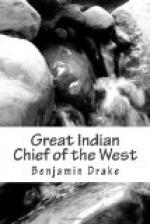and leaning upon the knee of the chief, sat his son,
a boy of nine or ten years old, whose fragile figure
and innocent countenance, afforded a beautiful contrast
with the athletic and warlike form and the intellectual
though weather-beaten features of his father.
The effect was in the highest degree picturesque and
imposing. The council was opened by smoking the
pipe, which was passed from mouth to mouth. The
Secretary then briefly addressed both parties, in
a conciliating strain, urging them, in the name of
their great father, the President, to abandon those
sanguinary wars, by means of which their race was
becoming extinct, and to cultivate the arts, the thrift
and industry of the white men. The Sioux spoke
next. The orator, on rising first stepped forward,
and shook hands with the Secretary, and then delivered
his harangue in his own tongue, stopping at the end
of each sentence, until it was rendered into English
by the interpreter, who stood by his side, and into
the Saukie language by the interpreter of that tribe.
Another and another followed, all speaking vehemently
and with much acrimony. The burthen of their
harangue was, the folly of addressing pacific language
to the Sauks and Foxes, who were faithless and in
whom no confidence could be placed. ’My
father,’ said one of them, ’you cannot
make these people hear any good words unless you bore
their ears with sticks.’ ’We have
often made peace with them,’ said another speaker,
an old man, who endeavored to be witty, ’but
they would never observe any treaty. I would as
soon think of making a treaty with that child,’
pointing to Keokuk’s little boy, ‘as with
a Saukie or Musquakee.’ The Sioux were evidently
gratified and excited by the sarcasms of their orators,
while their opponents sat motionless, their dark eyes
flashing, but their features as composed and stolid,
as if they did not understand that disparaging language
that was used. We remarked a decided want of
gracefulness in all these speakers. Each of them
having shaken hands with the Secretary, who sat facing
the audience, stood immediately before and near to
him, with the interpreter at his elbow, both having
their backs to the spectators; and in this awkward
position, speaking low and rapidly—but little
of what they said could be heard except by the persons
near them. Not so Keokuk. When it came to
his turn to speak, he rose deliberately, advanced to
the Secretary, and having saluted him, returned to
his place, which being at the foot of the stage, and
on one side of it, his face was not concealed from
any of the several parties present. His interpreter
stood beside him. The whole arrangement was judicious,
and though apparently unstudied, shewed the tact of
an orator. He stood erect, in an easy, but martial
posture, with his robe thrown over his left shoulder
and arm, leaving the right arm bare, to be used in
action. His voice was firm, his enunciation remarkably
clear, distinct, and rapid. Those who have had
the gratification of hearing a distinguished senator




